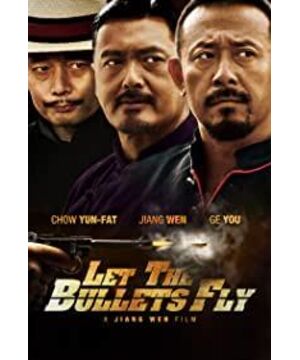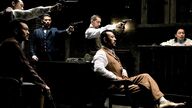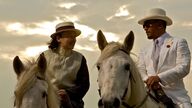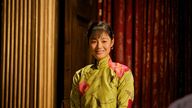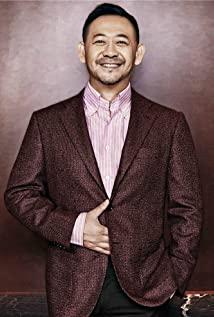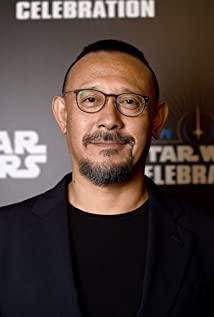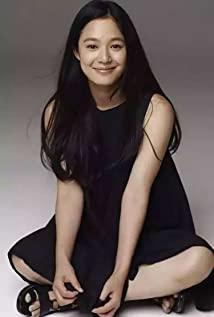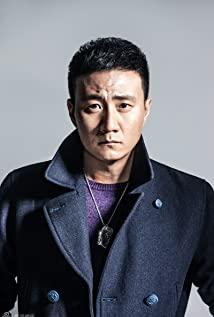If you try to find a way to interpret the movie, it must not exist in a large number of humorous lines and outstanding actors' performances. The entrance is nothing else, but the phrase "Let the bullet fly for a while". Driven by the rapid burning of gunpowder, the bullet was launched and flew forward. Although "Let the Bullets Fly" preached "the gun is in hand, follow me", but in the climax part, it is not one or several bullets that really control the overall situation. "Let the Bullets Fly" does not have the duel of Western films, and there is no magnificent rain of bullets. The whole process is reversed only because Sister Hua found Huang Shilang's stand-in, which is almost a sudden accident of gambling nature. Where did the bullet finally go? In fact, the end has clearly told the audience, Shanghai Pudong. The bullet turned into a moving train, broke through the square buildings and out of the Goose City. The past is the present, and the present is the past.
In relation to the continuing pain after the first shot of the Revolution of 1911, it can be said that "Let the Bullets Fly" tells a gradual revolution. Without the support of civilians, Zhang Mazi and the gang would never be able to do it overnight. This kind of pain is manifested in the film as three days and three nights of waiting. If you understand this, "Let the Bullets Fly" can't be simpler, and everyone can take their seats. In a broad sense, Goose City is only the first stop. The situation that Jiang Wen hopes is that the revolutionary train will go to Shanghai and Pudong today. This is a signal of change in the field of film, and it can also be interpreted as another signal.
Therefore, "Let the Bullets Fly" can indeed be called "Revolutionary Past" or "Chinese Past Events". This is not deliberately exalting, just because of the background of the Beiyang period, Zhang Mazi followed the identity of General Songpo (Cai E), and the word revolution did not cover too much. It is the same city. If "October Besieged City" is just an idealized revolutionary confession, then "Let the Bullets Fly" is to adapt the measures to local conditions and put the revolution into practical action. It's not that there is no dinner or confrontation and cooperation in the film, but in the face of the revolution, they are just sporadic embellishments. In traditional drama repertoire, stories of eradicating bullies are not uncommon. "Let the Bullets Fly" borrowed a shell, saying that the revolution must use violence, just like Zhang Mazi cut off the head of his substitute without hesitation.
For normal people, the scene of beheading is a bit bloody, but it is no better than the previous bowl of jelly. Hu Wan wickedly said that it was too shallow, and then opened it a little bit. It is not clear that Jiang Wen has put the CLUT flavor into the movie. In my opinion, the beheading scene also leads to "The Devil Is Coming", and Jiang Wen seems to be resurrected. It's like hanging the butt on the tree is black humor, but there are also Ma Xiaojun's bicycle hanging on the tree, the crazy mother on the tree, and so on. Jiang Wen amplifies courage, absurdity, and irrationality, which are extremely rare in most Chinese movies.
For a large part of the time, the actors of "Let the Bullets Fly" seemed to be performing on stage, highlighting the dialogue, relying on close-ups, and the Goose City turned into a stage background, perhaps the table, chairs and fan rulers. The film lacks Jiang Wen's dreamy and poetic past, and there is almost no transition of fading in and out. It is said that the film even uses the method of taking out a few frames of film to speed up the physical speed of the characters' actions. With such a carefully conspired setting, it is strange that the narrative rhythm is not fast. Only in the following three days and nights, when the Wanmin Umbrella fell several times in front of the full moon, many people suddenly couldn't understand it. It should be said that only at this moment will "Let the Bullets Fly" really be more like a movie. There are things that cannot be explained clearly by the lines, and the audience needs to know it by themselves. Not to mention the sense of the screen, this paragraph is also like a scene description on a comic book insert, and the big heads of the characters and exaggerated body language in the whole movie seem to be born out of the comic book.
However, "Let the Bullets Fly" is not a drama or a comic, it is still a movie. Take the robbery of the train and the Hongmen banquet as examples, these two paragraphs involve wonderful scene scheduling. Take the train with my wife, eat hot pot and sing songs, under the joy and enthusiasm, the crisis comes immediately. This opening scene has a prestigious aura, crossed inside and outside, and the bandits made a super cool appearance from static to dynamic. Going to the Hongmen Banquet in the room, this scene mainly highlights the tense relationship between the characters, and uses sports shots to express the sense of tension, to show that conflicts may erupt at any time.
If the film lines and performances are easy to narrow the distance with the audience, then Jiang Wen has been creating the effect of alienation, instead of blindly laughing and uncontrollable. Horse-drawn trains, hot pot feasts, drumming with the body, laparotomy to expose the body to the ground with guns and silver, "Let the Bullets Fly" has too many unreal or surreal things, which will make people feel unreality-just like I was really watching a show that played hundreds of times. But after pulling out of the story situation for a short time, the audience was forced to immerse in it quickly, which caused the amount of information to be too large and difficult to digest, so that many people felt that it was not enjoyable after reading it.
The movie is still filled with a large number of Jiangwen tags, such as the heroism of the leader worship, the excessive obsession with guns and uniforms, the carnival in the square, the number symbols of mahjong tiles, and animals such as geese and eagles. If you analyze these one by one, Jiang Wen must be happy to see it. Just as the fate of Ma Xiaojun and Ma Dasan encountered, Zhang Mazi also fell into a kind of helplessness in the end. What he had been looking forward to and pursuing all of a sudden fell in vain, and there was nothing, which brought a huge psychological contrast and loss. Unfortunately, because Jiang Wen stood too high, the average audience could not understand his loneliness. If they knew better, they would also see themselves incarnate in the face of the confused crowd.
There are many regrets in "Let the Bullets Fly", such as Jiang Wen's convergence of the author's style, but I always feel that the biggest problem comes from the shortcomings of the soundtrack. This movie directly uses the music that Hisaishi Jean gave to "The Sun Also Rises", and the shadow is still there. Regardless of whether it was forced or deliberately, it felt like Jiang Wen finally spit out the long backlog of grievances. Although the previous "Tangshan Earthquake" also directly misappropriated Oshimaman's soundtrack for "Northern Zero Year" (Oshimaman also dubbed "The Wind"), but the similar approach is still a bit lazy. Even if Jiang Wen went to learn Quentin to pick some old music, it was much better than his current practice.
Time goes back to 1995. Earlier, "End of the Dead" and "Real End of the World" had just entered China and opened the era of blockbusters. However, "Sunny Day" just created a living miracle. In 2010, in the face of "Avatar" and "Inception", Chinese-style blockbusters relied on policies to protect themselves from deception. This time, "Let the Bullets Fly" turned out again. Therefore, asking whether "Let the Bullets Fly" is good or not is not a question at all. 【International Herald Guide】
View more about Let the Bullets Fly reviews


